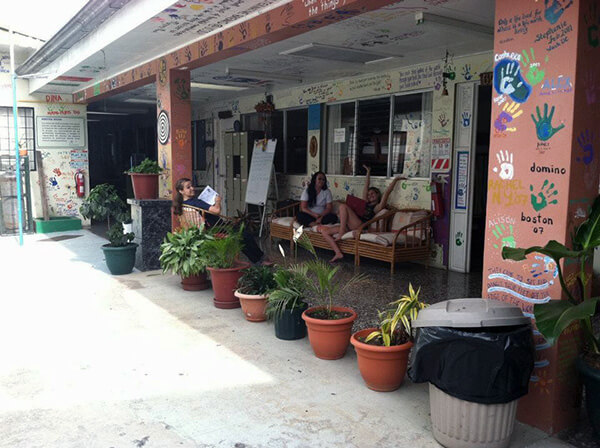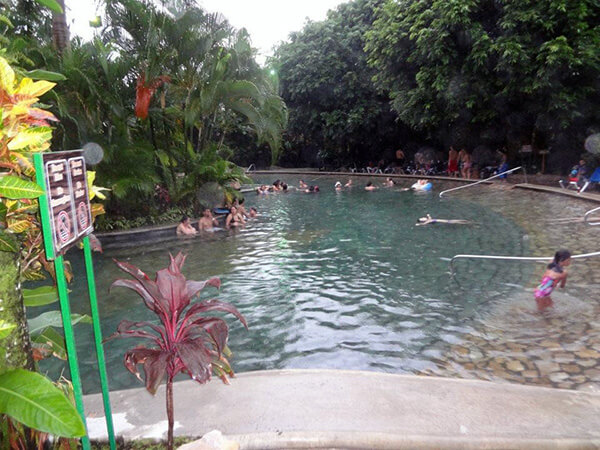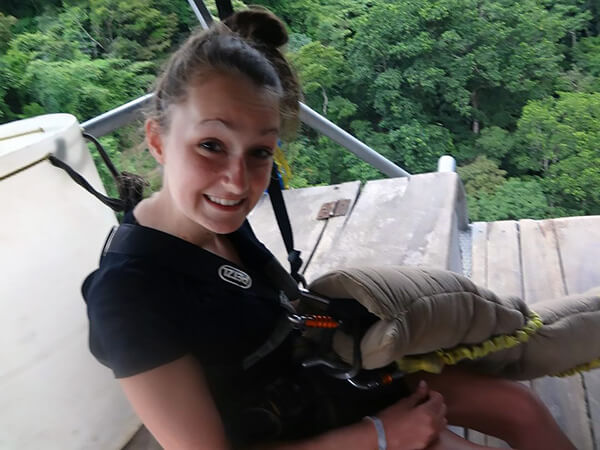Volunteer and Travel in Costa Rica
Experience the Beauty
Article and photos by Shannon Kelly

|
|
Home base for volunteers in Cartago, Costa Rica.
|
My first experience going abroad and experiencing a culture outside of the United States occurred when I volunteered in Costa Rica last July. It was the summer after my high school graduation and I wanted to do something to make me out of my comfort zone before making the transition to college. I have always loved helping people and traveling, so I decided to attempt to combine the two.
Lots of planning went into the trip — months before the day arrived. After I made the initial decision to go abroad, there were many things I had to consider. In addition to all of the planning that goes into traveling abroad, I also had to consider accommodations because I use a manual wheelchair.
Where to go?: With nearly 200 countries in the world, once I started looking for places to go, it was hard to pick just one. I wanted to see the world! I narrowed down the choices considerably when I decided to put my high school Spanish to good use. I also knew I wanted to volunteer, resulting in picking an underdeveloped country. I also wanted to keep safety in mind because my mom wasn't thrilled about me going abroad for the first time alone.
Who to go with?: Unfortunately, of all my friends, I was alone in the desire to go abroad last summer. I had to find an organization to go with since I didn't want to wander without a destination once I got off the plane in a foreign country. I also had to worry about getting around in a wheelchair. Underdeveloped countries do not have the same accessibility laws as the USA, so I had to ensure that whatever organization I chose would work with me. I discovered the Mobility International USA site,
is an excellent resource for people with disabilities wanting to go abroad. After talking with one of their representatives and explaining my hope for traveling abroad that summer, they suggested a few organizations that have accommodated disabled people in the past. One organization is called Cross-Cultural Solutions, and after exploring their website and talking to one of the Program Advisors, we decided that the volunteer program in Cartago, Costa Rica, would be the best option for me.
Going Abroad Expenses
Everyone knows that traveling can be expensive.
Through CCS (and many other such volunteer organizations exist in Costa Rica and have comparable or their own variation of such capabilities), I paid a program fee that covered these important needs:
-
Housing: I stayed at the CCS home base with 30 other volunteers who also came from all over the U.S. The people ranged from 18 to 50 years old; most of us were in college. The home base was a renovated school, and the classrooms were renovated into bedrooms, which held 4 to 6 of us.
-
Transportation: Provided to and from the airport and volunteer placements if they weren't within walking distance.
-
Meals: A cook prepares three meals daily, Monday through Friday, which usually contain typical Costa Rican food. We ate a lot of fresh fruit and arroz con pollo (chicken and rice).
-
Travel insurance.
-
Cultural learning activities: These were things that we did in addition to volunteering, including Spanish lessons, dance lessons, cooking lessons, and field trips to places like a coffee plantation and Volcan Irazú.
-
In-country staff: They ran the programs while we were in Costa Rica and included the program director, cook, housekeeper, drivers, and night security guard.
-
Out-of-country staff: USA-based staff helped prepare for the trip and communicate with in-country staff when I was abroad.
Some additional expenses included:
-
Plane tickets: Round-trip airfare to Costa Rica from Chicago was around $600. I had a connecting flight in Miami, and the overall flight time was about six hours.
-
Passport: It cost close to $200+ including the book, card, and passport picture. It can take at least 11-15 weeks to receive (with a fee to expedite the process, or the option to pay a fee to go through a passport agency to further expedite the process), so start planning early.
-
Exit fee: I had to pay an exit fee to leave the country. However, if you plan to stay less than 90 days, you do not need a visa to visit Costa Rica.
-
Laundry: This was not included in our program fee; there were Laundromats around town, and they could be a bit pricey.
-
Weekend travel: I went through CSS in the program, and we were free to travel around the country during the weekend. The costs included staying in hostels, food, transportation, souvenirs, and activities.
-
Phone cards: I paid $10 for 30 minutes on the phone, but there are many options depending upon your needs and if you have an international phone plan. My home base also had Wi-Fi, which I used to communicate overseas via Skype and FaceTime.
-
Immunizations: I had to get the Hepatitis A and Typhoid fever vaccine.
Money in Costa Rica
The money in Costa Rica is called Colónes. They come in coins and bills. 500 colónes is equal to $1. 500 colones is a coin, 1000 colónes is a red bill and is also known as 1 mil, 2000 colónes is a blue bill and is known as 2 mil. There is also a 5000 bill, 10,000 bill, and so on. There are larger face-value bills, but I never possessed them since I didn't want to carry so much money around.
Many tourist locations also take American money since it is more difficult to find. There are ATMs all over towns in Costa Rica. You can also exchange money at the airport, but you have to be careful about the exchange rate.
Banks are important in Costa Rica. You must be swiped with a metal detector wand to get into the banks. Security guards are also standing at the front of the bank with machine guns. I remember an ATM stole my debit card one time. It was hard to get it back since the bank had already closed for the day, and they were reluctant to help us. Since there is no military in Costa Rica, this is one way that they practice security. Another way to handle their security needs is to have bars on their houses to offer protection from crime.
Accessibility in Costa Rica
As I said, since I use a manual wheelchair, I had to do a lot of extra planning, both in the United States and in Costa Rica. The in and out-of-country staff tried their best to accommodate my needs. Nevertheless, everything could have been more efficient because Costa Rica remains an underdeveloped country in some ways. The home base was pretty accessible because it was all on one level, but it was a hassle to get over the gate, so there was a ramp we used, or people had to tip me back. Either way, I had to be accompanied by someone whenever I went because I needed help over the gate, and many sidewalks and buildings were inaccessible. The sidewalks were torn up, broken, and uneven. Sometimes, the sidewalk disappeared completely or had stairs at the very end. Many cobblestone streets made getting around in a wheelchair difficult. For this reason, I always needed someone to help me get around. It was hard to rely on complete strangers to help me, but if I didn't do this, I wouldn't be able to go anywhere.
Planning weekend travels was demanding, as well. We had to plan and ensure the hostels we stayed in were at least partially accessible. It was also hard to find activities I could engage in while traveling since many included outdoor activities. I have my group members to thank for helping me as much as they could during that trip. I also had a staff member as my assistant during the week. They accompanied me to the Cultural Learning Activities and Volunteer Placement.
Volunteer Placement
The main reason I went on this trip was to volunteer. We had placements in nursing homes, an HIV facility, and schools for children. We were at this placement from 8 a.m. to 12 p.m. when we returned for lunch.
I was volunteering in a nursing home for the first two weeks. While there, I socialized with the residents, played games, and worked on crafts. I also did some painting and laundry to help the staff when they didn't need assistance with the residents. This placement was difficult for me because there was a lot I couldn't help with due to my wheelchair. There was also a significant language barrier because they were very quiet, so communicating was hard. Still, you could tell they appreciated us being there.
The last week I went to a school and helped in a Kindergarten classroom. It took the kids a little while to warm up to me because they needed to familiarize themselves with my chair since it isn't a well-known sight in Costa Rica. Once we became friends, I was one popular girl in that classroom. I helped the teacher with lessons and taught easy English lessons such as colors and numbers. We sang songs, painted, and played the days away. During my free time, the little girls often pulled me to the kitchen and the dollhouse. I asked for helado (ice cream), and las uvas (grapes), and the girls would run and get me the toy food. I have never met kids so carefree and imaginative. They were so appreciative of everything they had.
Travel While in Costa Rica
While in Costa Rica, I traveled outside the home base for two weekends. The first weekend, we visited La Fortuna and Baldi Hot Springs. These pools are heated by the earth and the volcanoes. On the second weekend, we went to San Jose on Friday night, and on Saturday, we went to Andalucia to go bungee jumping over a bridge. These are two wonders that I wouldn't have been able to experience in the U.S., both of which I will never forget. We used private shuttles for transportation over the weekend, which only cost a little if many people were going, or the bus, which did have a working lift most of the time.

|
|
Baldi hot springs in La Fortuna.
|
Recommendations
-
Bring medical supplies: I tried to get antibiotic ointment when I was there and it didn't work.
-
Bring rain gear: It rained often and the cloudbursts were very spontaneous, especially when you go during the winter season as I did.
-
Know a little bit of Spanish: It makes it easier to get around, plan things, order, and connect with the people.
-
Be cautious: There are bad parts and bad people in every country.
-
Keep an open mind: Don't compare it to home — just take it for what it is.
Conclusion
Going to Costa Rica was one of the most life-changing experiences I have ever enjoyed. As a result of my trip, I am planning to travel to South Africa for three weeks in May. If you plan early, keep an open mind, and remain open to adventures, no matter where you go, you will have a memorable experience. I feel so fortunate that I had the opportunity to go to Costa Rica.

|
|
The author is about to bungee jump in Andalucia, Costa Rica.
|
Shannon Kelly is a freshman at the University of Illinois, expecting to graduate in May 2016. She volunteered for three weeks in Costa Rica. Shannon is studying Broadcast Journalism.
|
